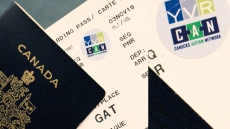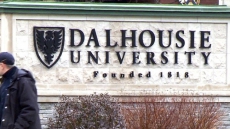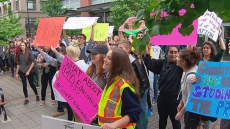VANCOUVER — The federal cabinet's decision to approve Kinder Morgan Canada's Trans Mountain pipeline expansion has prompted a flood of outrage and promises of protests, court challenges and civil disobedience in British Columbia.
Vancouver Mayor Gregor Robertson said he was "profoundly disappointed," calling the decision a "big step backwards" for Canada's environment and economy.
"I — along with the tens of thousands of residents, local First Nations, and other Metro Vancouver cities who told the federal government a resounding 'no' to this project — will keep speaking out against this pipeline expansion that doesn't make sense for our economic or environmental future."

The $6.8-billion project would triple the capacity of the Trans Mountain pipeline, from 300,000 to 890,000 barrels a day, and would add 980 kilometres of new pipe along the route from near Edmonton to Burnaby, B.C.
It would also increase the number of tankers leaving Vancouver-area waters seven-fold, from five to 34 per month, prompting fierce opposition from local mayors and First Nations who say any risk of a diluted-bitumen spill is unacceptable.
Prime Minister Justin Trudeau announced the project would be approved with 157 conditions at a news conference Tuesday. He said he expects the decision to be "bitterly disputed" by a number of people across the country, but said the project is in Canada's best interests.
"If I thought this project was unsafe for the B.C. coast, I would reject it," he said.

Premier Christy Clark has insisted her government would not allow new pipeline construction unless five conditions were met, including a "world-leading" marine spill response regime. Earlier this month, Trudeau announced a $1.5-billion ocean-protection plan.
Clark was unavailable for comment Tuesday, but her Environment Minister Mary Polak said the province will continue to work to ensure each of its conditions are met.
"Because we have taken that clear and principled approach to stand up for our province, we have seen the proponent and the federal government take actions, including Ottawa's recent Ocean Protection Plan," she said in a statement.
North Vancouver's Tsleil-Waututh Nation and the City of Vancouver already have legal challenges before the courts. The actions were filed in May after the National Energy Board recommended the federal government approve the project.

Delegates from the Tsleil-Waututh Nation travelled to Ottawa on Monday to urge Natural Resources Minister Jim Carr to reject the project.
On Tuesday, Tsleil-Waututh spokeswoman Charlene Aleck accused Trudeau of breaking his promise of a "renewed, nation-to-nation relationship with indigenous peoples."
"They are making a big mistake. We will not allow this pipeline to be built," she said.
Carleen Thomas, a member of the Tsleil-Waututh, spoke Tuesday night at a rally against the government's decision in Vancouver.
"They sold us out. They threw us under the bus. They threw us under the tank and this is not acceptable," she said.
Hundreds of people gathered for the rally, carrying signs with messages like "Stop Kinder Morgan" and "Leave Fossil Fuels in the Ground."

Bob Chamberlin, vice-president of the Union of B.C. Indian Chiefs said the last-minute event was just the first action against the government's decision.
He expects to see more court challenges, protests and civil disobedience, and told the crowd he looks forward to getting arrested alongside them.
The move will hurt the Liberals at the ballot box come next election, too, Chamberlin said.
"Everybody's going to remember all of the hollow rhetoric and the promises that they made. And they forgot to say that they're just kidding," he said.
The business community in B.C. was pleased. Ian Black, president and CEO of the Greater Vancouver Board of Trade, said the project will generate more than $1-billion in construction spending and create thousands of high-paying jobs.
Kinder Morgan Canada called the approval a "landmark decision that affirms both the strength of the project and the rigour of the review process it has undergone."
Trudeau also announced Tuesday that his government has rejected the Enbridge Northern Gateway pipeline and imposed a moratorium on crude oil tankers on B.C.'s north coast. The news was met with celebration from those First Nations opposed and environmental groups.
The West Coast Environmental Law Association said the rejection proves communities can stop pipelines.
The Gitga'at First Nation said the decision ends a struggle that pitted the Gitga'at and their allies against Enbridge in a "David vs. Goliath battle."
B.C. PREMIER CHRISTY CLARK'S FIVE CONDITIONS FOR PIPELINE APPROVAL
British Columbia Premier Christy Clark said Wednesday the federal government is "very close" to meeting her five conditions for pipeline approval. The premier said all but two of the conditions have been met: a "world-class" marine spill response regime and economic benefits to B.C.
She made the comments a day after Prime Minister Justin Trudeau announced the federal cabinet had approved Kinder Morgan Canada's Trans Mountain pipeline expansion. The project would triple the capacity of the line and increase the number of tankers in Vancouver-area waters seven-fold.
The conditions were first unveiled in 2012. Here's a look at the progress that Clark says has been made:
1. Successful completion of the environmental review process.
B.C. initially planned to rely on the National Energy Board's review of the expansion. The B.C. Supreme Court ruled earlier this year that the province cannot simply depend on federal reviews, and the B.C. Environmental Assessment Office launched its own review in April.
Environment Minister Mary Polak said Tuesday that the office anticipates it will "soon" complete its assessment. There is no timeline for when it will be done. However, Clark indicated Wednesday that this condition was among those that had already been met.
The energy board recommended in May that the federal government approve the project, subject to 157 environmental, safety and financial conditions. The City of Vancouver is among several interveners who have filed court challenges of the recommendation, arguing the process was flawed.
2. World-leading marine oil spill response, prevention and recovery systems for B.C.'s coastline and ocean to manage and mitigate the risks and costs of heavy oil pipelines and shipments.
Earlier this month, Trudeau announced a $1.5-billion ocean-protection plan. He said the money will be spent over five years starting in 2017 and includes funding to create a marine-safety system, restoring ocean ecosystems, and new methods and research to clean up oil spills.
Clark said the plan was a "really positive response" to the province's work with the federal government on ensuring the coast is protected. However, she said she is still awaiting details from Trudeau before she can say this condition has been met.
3. World-leading practices for land oil spill prevention, response and recovery systems to manage and mitigate the risks and costs of heavy oil pipelines.
The premier suggested this condition had been met, but she did not explain how. Earlier this year, the province formally opposed the expansion in its submission to the NEB because its conditions on land-based and marine-based spill response had not been met.
The energy board considered protection of the land and pipeline safety in its review and several of its conditions addressed this issue.
4. Legal requirements regarding aboriginal and treaty rights are addressed, and First Nations are provided with the opportunities, information and resources necessary to participate in and benefit from a project.
Clark indicated this condition had been met, even though several First Nations on B.C.'s south coast remain adamantly opposed to the project, most notably North Vancouver's Tsleil-Waututh Nation, which has filed a court challenge against the NEB's recommendation.
An earlier challenge filed by the nation arguing the Crown had breached its duty to consult was dismissed in September. The Federal Court of Appeal ruled that the First Nation had declined opportunities for consultation leading up to and during the review.
The energy board heard from 73 indigenous participants during the review. Kinder Morgan Canada has said it has 40 letters of support from First Nations communities.
5. British Columbia receives a fair share of the fiscal and economic benefits of a proposed heavy oil project that reflects the level, degree and nature of the risk borne by the province, the environment and taxpayers.
Clark said this condition has not yet been met. Only 50 full-time permanent jobs will be created in B.C. after construction, but the premier insisted that the construction jobs while the pipeline is being built are "good, solid, family-supporting jobs."
She said more discussion is needed about the benefits that come to B.C. from the pipeline because the province is taking "the bulk of the risk." The discussion has already started and could wrap up fairly quickly, she said.
In 2013, she said she had agreed with the Alberta government that none of Alberta's royalties from oil pipelines would go to B.C.





